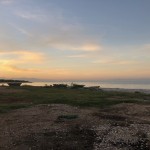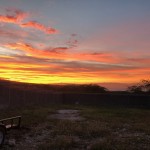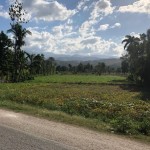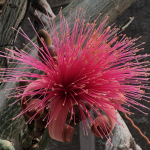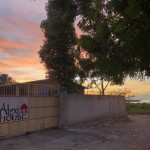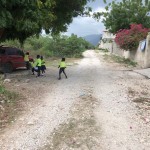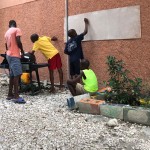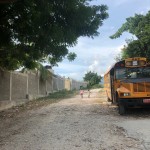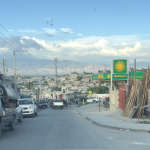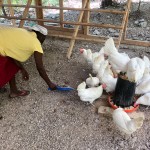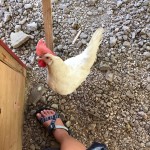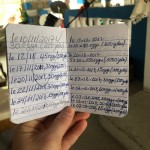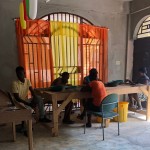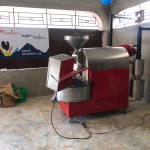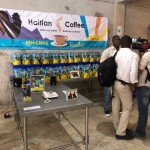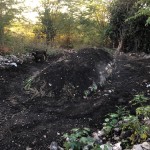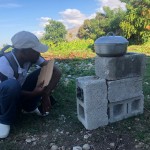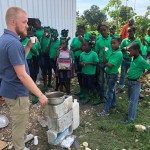Sawadee ka, from America!
I’ve been home from Thailand for a few weeks now, and am wrapping up my blog with this final post. Since my return, I’ve been trying to process everything I experienced, and keep the wonderful memories of the Boys and our relationships alive. Stories are the best way I know how to do this (all names have been changed to protect their identities).
Nok is the boy who I probably spent the most time with, who I learned the most from and who was also the most challenging to work with. He is very intense in his facial expressions and the way that he spoke. From the first day we met, he decided my name was Natalie, and would call me that consistently for the rest of my time at Urban Light. For the first few weeks, as I laughingly corrected him over and over again, I wasn’t sure if he just couldn’t remember my real name or was messing with me. Eventually, it was clear the latter was true; we would have lighthearted arguments in Thai over which one of our names was Natalie. From then on, it was a running joke in the center – boys who I’d never met before would think my name was Natalie too!
Nok was very helpful, especially when it came to learning Thai. He would sit with me in the office, distracting me as I worked on my computer, always asking me what I was doing and where I was going, flicking me and talking very quickly in Thai, expecting that I understood him (I couldn’t haha). He would teach me random words in Thai, like chair and shirt, and laugh with me at my atrocious pronunciation. He once helped me count to 100 in Thai on a Friday excursion.
He is a Christian, and when I told him I was too, he made the sign of the cross and invited me to his church. He also brought me random gifts, like a Thai Bible, some self-help DVDs and snacks from 7/11.
Nok could be very up and down, and I had to work to establish appropriate boundaries with him (though no fault of his own – few of the boys have good examples of healthy relationships in their lives). He liked to sit very close, and could be flirtatious and overly affectionate, which I had to communicate was inappropriate. Sometimes, he would say sweet things like “Lauren is like my older sister at Urban Light”; other times, he would tell visitors or other volunteers that I was his girlfriend. It just depended on the day!

Nok posed himself with the guitar and asked me to take his picture.

Nok and I walking back to the center after an excursion at a music store.

Nok with his origami krathong, made in an art workshop at the time of the Loy Krathong festival.
Hong is very sweet and soft-spoken. Also a Christian, I would often find him playing worship songs on the guitar in the center. He didn’t like to sing, though, so he would quietly tell me what song it was (usually, Blessed Be Your Name), and I would sing while he played. Some of my favorite moments in the center were those impromptu worship sessions with him. Once, he began playing Hosanna by Hillsong, which is one of my favorites, and I excitedly sang along with him and Mon, one of the interns from Chiang Mai University.
Hong also taught me to play the card game Skipbo, mercifully providing an alternative to my many games of UNO. He won every single time I played with him.
Hong has had a tough life: his father was abusive, and he desperately needed glasses – he was once hit by a car because he didn’t see it coming – but he had one of the gentlest, peaceful, resilient dispositions I’ve ever encountered.

Hong playing guitar on an excursion to the pool.

Hong learning to screen print in an art workshop.
Tim is a tiny, skinny boy with a big attitude, who claimed to be 18. In reality, he couldn’t have been more than 15. But that is the reality for these boys: they are forced to grow up entirely too quickly. He picked up on the Natalie game, and continued the schtick in weeks when Nok was not around, even calling Chloe and other farong Natalie. He is very clever and always made us laugh, while also trying to find ways to get onto YouTube on our phones and get us to buy him food. He is so precious.

Tim loved to use my camera and take photos around the center. He has a good eye, too!

Chloe, Tim and I on Chloe’s last day at UL.

Chloe and Tim are the best of friends – here, they’re mixing paper mache for an art workshop.
Mot would always tell me he liked me, but clarify with “not love!” because he didn’t want to cross any boundaries. He came into the center one day and gave me a flower. He was on crutches most of the time, after he hurt his leg in a motorbike accident. He is a good guitar player and loves Linkin Park.

Mot playing guitar on UL’s rooftop.

Mot working hard in an art workshop.

The flower Mot gave me.
Ah has a very stern-looking face, and can come across as intense, but as soon as you get him laughing (or actually, when he laughs at his own jokes), his face instantly changes into a wide grin, and he lets out a long, high-pitched giggle, after which his face immediately goes back to his stern expression. It was so funny, and easy to laugh along. He never wanted to play UNO, but would sometimes come into the center and play ping pong with us. When he was bored with just a regular game, he hit the ball so hard it flew off the roof and into the street, accompanied by his giggle.
Ah was the first boy to really learn my name. At the beginning of my placement, I started introducing myself as “Lo,” thinking it would be easier to remember than “Lauren.” However, Ah knew me as Lauren, so when another boy called me “Lo,” he got a little upset, and corrected the other boy instantly.
One of my favorite moments with Ah was on one of our Friday excursions to the soccer field. Before we went, Ah showed me his new outfit: a bright yellow duck pajama set. He was so proud of it, and washed and dried it at the center (panicking for a moment when he briefly misplaced it), then wore it on the soccer field. We were giggling the whole time – it was so hilarious and sweet!

Head to toe duck pajamas!!

Ah painting a pumpkin at UL’s Halloween party.
Bee was one of the most dedicated guitar players at the center. He loved to play guitar and sing, and wanted to play with Chloe and I, but only knew two songs in English: “Sign of the Times” by Harry Styles and “Attention” by Charlie Puth. Suffice it to say, I learned those songs VERY well by the end of my six months...
Bee, along with fellow volunteers Mon and John, was the first to realize that my name sounds like “lolen” – the Thai word for “joking around.” It stuck, and Lolen became my Thai nickname (get it? My life is a joke!).
Sadly, Bee wasn’t around the last few weeks of my placement, because he happened to be in the area where a gambling ring was busted by the police. He was arrested and jailed even though he wasn’t involved.

Bee is a very talented musician.

Bee sparring with the Aikido sensei on an excursion to the dojo.
Tai is one of my favorites, and my hardest won relationship. He is technically a former UL boy, who has gotten off the streets and now helps out around the center and serves as a role model to the boys. For the longest time, I didn’t think he liked me. Every morning, when I came into the center, I would greet him in Thai. Occasionally, he would say hello back, but most of the time would just nod at me without looking up. He would get friendlier as the day went one, even joining us for a game of UNO every now and again, but I still wasn’t sure how to read him.
After awhile, he started to warm up to me, until one day, suddenly, we were friends. He came upstairs into the office space, and in a high pitched voice that was supposed to sound like mine, he mimicked the way I said his name and other Thai phrases. From then on out, that was our “thing,” and I loved it. We would have other conversations too, including one where I asked him how he was, and he responded mai sabbai (not good). I would ask him why, and he would loudly exclaim with a smile “no money, no honey!” He cracked me up, because sometimes the way he treated me was similar to my younger brother – if I made a joke, or did something silly, he would smile and shake his head at me, as if to say, “... you’re not cool, Lauren.”
The week before I left, Tai asked me at lunch what I wanted as a going away gift. Touched by the question, I told him I wanted a picture of him. He smiled and nodded his approval. Then, on my last day, he came up to me and presented me with a beautiful laminated photo of the late king and queen. Now, all Thai people adore and respect the monarchy, but Tai is something special. He views the king as the father he never had, and to honor him, he walked from Chiang Mai to Bangkok, twice. The king meant the world to Tai, so to receive this as a gift from him was a beautiful, meaningful gesture. I will treasure it always!

Tai’s mummy costume at UL’s Halloween party.

Tai and I on UL’s final excursion of the year: Mae Ngat Dam.

Tai serving lunch at the center.
Moo was one of the most regular attendees at the center. He loves UNO, more than anything else, and we would play nearly every day. Most days, he would walk upstairs into the office, smile mischievously, and ask in a high pitched voice “UNO?” How could I say no to that (I mean, I had to learn how, for the sake of productivity! But I didn’t want to!)? He was the fastest to warm up to me, and told me he loved me on my very first day. He would tell me this every day after, too 🙂
Sometimes, Moo was my designated protector, and would walk me part of the way home. It was always a sweet gesture.
Moo was always making us laugh, but one thing that cracked me up occurred when I brought my boyfriend Levi into the center for lunch. Moo got a little jealous, and told me in Thai that he didn’t know me. He smiled as he said it, just joking around.

Moo goofing off at the soccer field.

Showing off for the camera 🙂
I only met Benz in the last two weeks of my placement, but he was so friendly, it was like I’d know him the whole time. He gave me a permanent marker “tattoo” of a rose, and wrote on my arm in Thai that I owed him 35 baht.

Benz, Chloe & I (that’s his motorbike helmet!)

Moo posing with his motorbike helmet.
When I met Nu I could tell that he is a leader among the boys. He has the kindest heart, and speaks decent English. Whenever I would see him in the center, he would loudly say “Hello Lauren how are you.” He is a hard worker too; I once sat with him for awhile, going over English words in his learning book. It wasn’t very often that I came across a boy dedicated to learning on his own. I was very impressed!
Nu was very popular with the ladies, and often had a small crowd of teenage girls with him. Once, as we were closing up the center for the day, I looked on in horror as he climbed onto his motorbike with 3 other girls and drove off. My coworker P’Tu laughed at my surprise, and told me I had probably never seen that in America. She was right, and I never did come to understand how Thais could be so relaxed in busy traffic on their motorbikes.

Nu took me for a ride in his kayak at the Mae Ngat Dam!

Nu is also a talented musician – here he is on guitar on our Friday excursion to the music store.
Aod is one of the first boys that I got to know at UL. My first month, I was helping my fellow intern Zuzu with a greeting card project to generate income for Urban Light. Aod was our artist, so I spent many hours with him as we helped him create holiday greeting cards. He apparently was quite the handful when he was younger, but is now a very kind, sweet, thoughtful, talented young man.
In my last few months, Aod didn’t come around as often, likely because he had a new girlfriend. Sometimes they would come into the center together, and sit on the couch while he played Thai songs on guitar. She’d sing along, and it was too cute.

Aod is a rockstar – in and out of the studio.

Nu, Andy and Aod are the dynamic trio – very talented boys!
Andy is also an excellent artist, but he wasn’t interested in designing greeting cards. Truly an individual, he simply wanted to express himself through his art (he drew everything from intricate drawings to Pixar characters). My first encounter with him took place at the table where he liked to draw. I didn’t speak much Thai yet, but he was trying to communicate with me. When I didn’t understand, he wrote a word in Thai and showed it to me. I told him I still didn’t know, so he ran upstairs and had a staff member translate the word: “lover.” He was trying to tell me about his girlfriend! He then showed me her pictures on Facebook – clearly a proud boyfriend!
I enjoyed Andy’s presence in the center so much. He is so sweet and fun to be around. Once, he called my name from another room, and then tried to hide and scare me when I came in. When I told him I was going home to America soon, he just looked at me and said “Nooo.” He had decided I wasn’t leaving, and how could I argue?

Andy posing for a photo!

Andy crushing it on the drums on our excursion!

Andy playing with one of the younger boys on the soccer field.
Kab always has a big smile on his face, and his presence would light up the center. He is so funny and a big goofball, but is also very hardworking and earnest and thoughtful. Sometimes he would come into the center with a few girls, and it was always clear that he was respectful and took care of them.
Everyday at lunch, I would divide cleanup duties by having the boys draw sticks from a cup. A few of the boys liked to joke around and take the cup after lunch, but Kab was always the funniest: he’d grab it when I wasn’t looking, but made sure I saw his “who me?” face and mischievous glint in his eye. He’d then sprint up the stairs, and I’d follow, to find the cup neatly placed on my desk.
I have so many fun memories with Kab. Once, he brought a balloon animal kit in, and spent the afternoon blowing up the balloons then letting them fly around the office. One day, we pulled up Google maps, and he showed me where his apartment was (he had just gotten a job at one of the markets!), and a picture of his favorite internet cafe. He would often use my camera and take really awesome photos on it. He is so likable and funny and resilient – I will always be amazed by him.

Kab taking some great photos at the end of the year excursion to Mae Ngat Dam.

Kab is always a fun time 🙂

Kab hanging out at the pool.
Kab had a friend named Non, who didn’t come in often, but was always a delight when he did. He has the sweetest disposition. At first, I thought his name was Non-krawp (krawp is the words Thai males say at the end of sentences). He didn’t know how to correct me, but eventually UL’s psychologist P’Pop sorted it out, and we all laughed. Non and I would listen to YouTube together – his favorite artists were Slipknot and Taylor Swift (Love Story in particular!).
Tao is the most amazing transformation story that I saw while at UL. At the beginning of my stay, he had active tuberculosis and was very sick. He was working with our staff doctor to treat his illness, but it was a long and rigorous process. To prevent the disease from spreading, he had to wear a face mask at all times and could only be in certain areas of the center. It was clear that he was depressed as well, and had little energy to engage with me or the other boys. It absolutely broke my heart, but I didn’t know him as anything other than very ill.
But as time passed, he grew stronger, gained weight and soon enough, was able to walk around freely without a mask. As he recovered, I watched an entirely new boy emerge – the sweetest person on the planet, who loves being photographed flashing peace signs and helping me learn Thai. It was a complete transformation.
One of my favorite Tao stories: one day, he wandered into the center, walked up to my game of UNO and abruptly put A TURTLE right on the table. This poor newfound friend of his didn’t know what to do, and frankly, neither did I! But Tao did. He had me pet the turtle and hold the turtle and even took my phone and posed me for this photo! I was dying of laughter the entire time.
I loved talking with Tao, and we had some of the best half-English half-Thai conversations. He was always very encouraging with my Thai, and would teach me new phrases and words constantly. He is kind-hearted and gentle spirited.

The famous turtle and I, as photographed by Tao.

Tao and I at the park!

Thumbs up for the camera!
Needless to say, these boys changed my life, and I miss them desperately. Six months is a blink of an eye, but thankfully, it was enough time to form the most beautiful relationships and memories with the boys of Urban Light. And that’s the joy of this job, and this organization: to get to be a part of their stories, in whatever chapter they’re in. Sometimes, it looks like victory over illness. It looks like breakthroughs and laughter and transformation. Other times, it looks like struggle and injustice and heartbreak and addiction and trauma. sometimes, it’s hard.
But the staff at Urban Light are the most incredible examples of perseverance. Every day, they work tirelessly on behalf of these boys, accepting them for exactly who they are at that exact moment, and I have learned so much just by watching them.
But in some ways, it’s no wonder – once you meet these boys, you can’t help but love them.











